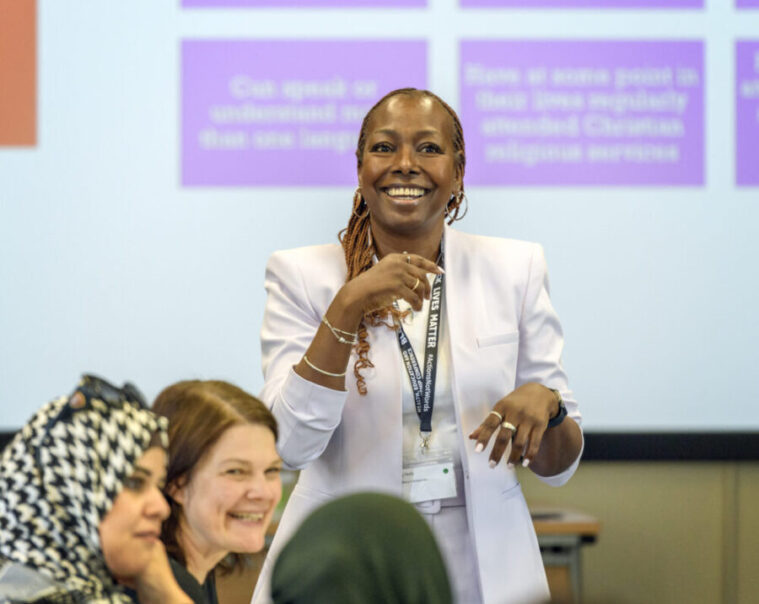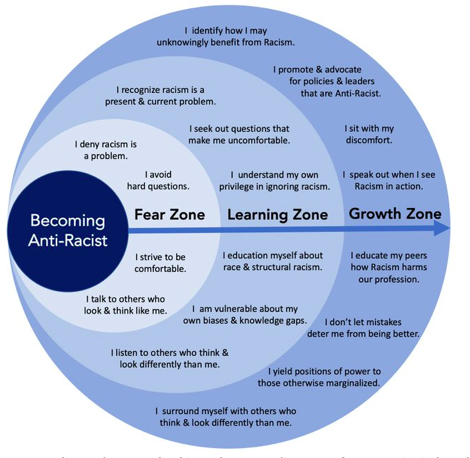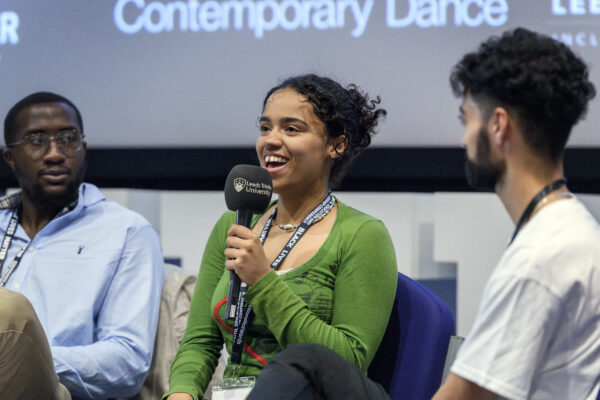Thoughts from Leeds Trinity University’s Black Lives Matter: Health, Education and Leadership Conference

Go Higher West Yorkshire (GHWY) was proud to be one of the partners of Leeds Trinity University’s (LTU) third annual in-person Black Lives Matter: Health, Education and Leadership conference.
This year’s theme focused on the interplay of physical/mental health, education, and leadership on the lived experiences of Black people. This was underpinned by accountability, transparency and action.
Helen Sykes, Head of GHWY, and Nichola Cassé, GHWY’s Higher Level Skills Manager, reflect on what they took away from the event.
Helen Sykes
Colleagues at LTU could not have picked a better day for bringing people together in person for discussion, debate and a common purpose. Arriving in glorious sunshine first thing in the morning, I was greeted by an atmosphere of optimism and anticipation – and the day did not fail to deliver.
The focus of the conference was on foregrounding the inequalities in experiences and outcomes across health and education, and the importance of leadership in addressing these. There were a huge number of highlights from the day, but I wanted to pick out and focus on a couple of key messages which have kept me thinking and reflecting.
It was great to see the day’s proceedings opened by Shames Maskeen – indefatigable Co-Chair of GHWY’s Network looking at the experiences of students from Black, Asian and Minoritised Ethnicities – who was the lynchpin of the event. He introduced LTU’s Vice Chancellor, Professor Charles Egbu, who began with a message of “respect, dignity, equality, hope and humanity.” Charles did not shy away from the importance of LTU’s Race Equality Charter bronze award as the first step in being explicit that there are and continue to be racial inequalities.
Charles set up the day with a message about our work being a marathon, but importantly he acknowledged that without a route map and milestones, good intentions can lose their way. This was picked up again in Professor David Mba’s afternoon presentation. David demonstrated almost the exact same recommendations from two racial equity reports 12 years apart: without specifics and without action, nothing changes. This was a key message that I will continue to reflect on as I work to utilise the strong networks across GHWY to turn words and intentions into outcomes.
Foluke Ajayi, Chief Executive of the Airedale NHS Foundation Trust, also shone a light on the assumed norms which permeate our society, and who may be being disadvantaged by them.
Foluke included in her slides a reproduction of what should be a standard textbook image of a pregnant belly complete with foetus. I was shocked to realise that this was the first time I had seen such a standard image represented with Black skin – and then even more shocked to realise that this image had only been produced by its illustrator, Chidiebere Ibe, in 2021. It was a striking and powerful way to reframe my thinking and challenge assumptions that I might not realise I am making, and who these may be excluding. Overall, it is clear that collaboration, and bringing in diversity of thought, are vital to effect change.
Nichola Cassé
When Shames set out intentions for the conference in his opening welcome, there were a few points that jumped out to me: that we gathered together as part of LTU’s response to students’ request for a platform for discussion around race equality; that the day would not question whether racism exists; and that it would focus on actions, not words.
This statement of intent set the tone for the day: purposeful, open, and proactively focused on growth and change, instead of blame or fear. Fear of change, and fear of doing the wrong thing, is a common reaction for those being asked to recognise their privilege and reflect on their own biases and assumptions. This sentiment was echoed in the graphic below, shared by Nathan Ghann, Programme Director of The Educate Group, in his excellent workshop on anti-racism:

Image credit: Andrew M. Ibrahim
For me, the most powerful session of the day was the student panel, sensitively chaired by PhD student Lewis Miles-Berry. Five students from different HE providers candidly shared their lived experiences of racism, inequalities, and injustices, as well as the actions and individuals who had supported and encouraged them. Their articulate accounts shed light on the profound impact of racism on their studies, confidence, and mental health. They also highlighted the value of initiatives like Black Leadership programmes in fostering healing and peer support. The panellists’ pain was sobering, and I was moved by the support the panellists offered one another – echoed with warm encouragement from attendees.
When asked what HE staff can do, the panellists had several suggestions. One was to ‘put your ego behind you’ – to recognise that a request for change or someone raising a problem isn’t an attack. Another suggestion was the importance of making oneself known to students as an anti-racist advocate. For students, universities or colleges can feel confrontational and impersonal, but as educators we can do more to let our students know they’re being heard and understood.
Another standout for me was ‘Re:Tension’, a short film created by Ricardo Barker, Associate Professor at LTU. It follows a Black university student and his experiences of how judgements from tutors and peers affect his ability to thrive in education. What I liked most about the film was its ambiguities – it didn’t lecture the audience, or even label what was being shown, but instead allowed empathetic communication and the effective sharing of stories. It was a beautiful and creative means of bringing to life the data about Black Degree Awarding gaps, and the ‘unexplained’ differences in retention rates for Black, Asian and other Minoritised Students in comparison with white peers.
Throughout the day, attendees, many of whom were from higher education providers, were encouraged to reflect on their positions and the power they hold to drive positive change. The speakers and organisers fostered engagement, accountability, and a willingness to be advocates for change. While acknowledging the harms of racism, the conference managed to maintain an energetic and optimistic atmosphere. This feeling culminated in the final session—a performance by students from the Northern School of Contemporary Dance. As the conference drew to a close, there was a genuine sense of joy, energy, and a shared commitment to creating real change.

Photo credit: Anthony Robling
Next steps: Helen Sykes
The day overall was very positive, but not without its moments of challenge and discomfort. It’s important to me personally to keep acknowledging and leaning into these. We are keen to maintain the momentum and to keep learning: GHWY is organising anti-racism training, which will be offered across our staff. Our aim with this is to support team members to better understand how structures might be working in a negative way, and to feel more confident being anti-racist.
We are also continuing to review our recruitment processes to make these more inclusive. This will be iterative, starting with the way we write job descriptions and undertake the interview processes, including the make-up of our interview panels, and evaluating the impacts of this.
There were some really powerful images shared in the conference which demonstrate how racism and assumed whiteness is part of the norm of our current society. We will be using images like this to help us to challenge the assumptions we bring to our work.
Finally, we will be delighted to work with LTU on its new Race Institute, supporting our colleagues there with the collaboration which is so necessary to the success of this work.
